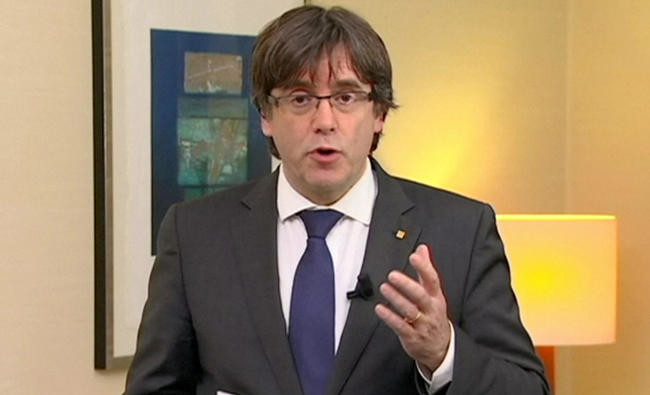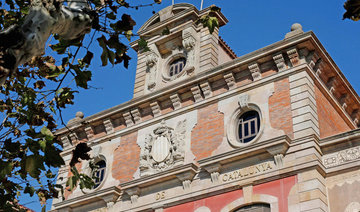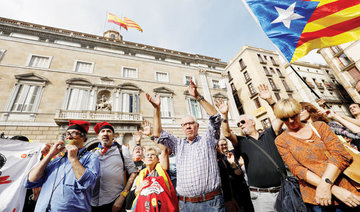BRUSSELS: The EU on Friday refused to intervene over the European arrest warrant Spain is set to issue for Catalonia’s deposed leader Carles Puigdemont, currently holed up in Belgium, saying it was a matter for the courts.
A Spanish judge is expected to issue the warrant demanding Belgium return Puigdemont, who is wanted for questioning over alleged sedition, rebellion and misuse of public funds in relation to his region’s independence drive.
Catalan efforts to make the crisis an international issue have so far failed, and the EU has been steadfast in its support for Madrid throughout, insisting it is an internal matter for Spain.
European Commission spokeswoman Annika Breidthardt reiterated that support at a news conference on Friday, deflecting a barrage of questions about Catalonia with the same response.
“This is a matter entirely for the judicial authorities whose independence we respect fully,” Breidthardt said.
Puigdemont’s Belgian lawyer Paul Bekaert, who in the past has helped Basque separatists militants challenge Spanish extradition requests, told Flemish television channel VRT on Thursday his client would fight efforts to send him to Spain.
Puigdemont, sacked as regional president a week ago by Madrid after the Catalan Parliament issued a declaration of independence, has been in Belgium since Monday and calls the allegations against him politically motivated.
A Spanish judge on Thursday threw eight members of Puigdemont’s axed regional government behind bars pending potential trial, prompting a protest by some 20,000 people in Barcelona.
The Catalan independence declaration was roundly spurned across Europe, with Germany, France and Britain rejecting it and EU institutions sticking to their support for the government of Spanish Prime Minister Mariano Rajoy.
The European Commission’s powerful chief, Jean-Claude Juncker, warned after the independence declaration that the 28-member bloc “doesn’t need any more cracks, more splits,” saying he did not want the EU “to consist of 95 member states.”
Juncker will be in the Spanish city of Salamanca on Thursday to receive an honorary degree.
EU officials fear Catalonia could spark a domino effect in a continent with numerous separatist movements from Britain to Belgium to Romania, and with the bloc still reeling from the impact of Brexit, a fresh blow to unity is seen as a major threat.
But the bloc’s stance is causing disquiet among some MEPs, who see Madrid’s hard-line handling of the crisis as running counter to European democratic ideals.
“The silence of the European Institutions remains astounding,” Ska Keller and Philippe Lamberts, the heads of the Greens bloc in the European Parliament, said Friday.
“While the European Com-mission is right to assert the rule of law as a foundation of the Union, so are fairness, building bridges and democratic principles, which have to be respected in all member states.”
EU refuses to get involved in Catalan leader arrest warrant
EU refuses to get involved in Catalan leader arrest warrant

Ambani’s Reliance pulls trademark application for codename of Pakistan strikes

- Ambani’s film studio withdraws application to trademark codename ‘Operation Sindhor’ against Pakistan after public and political uproar
- Reliance says phrase “Operation Sindoor” was “now a part of the national consciousness as an evocative symbol of Indian bravery“
NEW DELHI: Asia’s richest man Mukesh Ambani’s film studio has withdrawn an application to trademark the codename for India’s military strikes against Pakistan after a public and political uproar on social media against the move.
In a statement, billionaire Ambani’s conglomerate Reliance said the trademark application was filed inadvertently by a junior person at Jio Studios without authorization, adding that the phrase “Operation Sindoor” was “now a part of the national consciousness as an evocative symbol of Indian bravery.”
India said it hit “terrorist infrastructure” in Pakistan and Pakistani Kashmir earlier this week after militants killed 26 men, mostly Hindu, in Indian Kashmir. Sindoor, which refers to the red vermilion powder worn by married Hindu women, was an apparent reference to the widows left by the attack.
Reliance’s statement came hours after some social media users posted screenshots of the Indian government website showing some individuals and Reliance had filed applications for trademark registration.
“This isn’t branding, it’s blatant mockery ... It’s disturbing to see something so serious being reduced to a joke,” posted an X user who identified herself as Archana Pawar.
Aniruddh Sharma, a spokesperson for India’s main opposition Congress party, questioned why Ambani was trying to register the trademark for his business gains.
In its application, Reliance said it was for “provision of entertainment; production, presentation and distribution of audio, video.”
Bollywood films on India’s previous military operations have been huge hits. In 2019, “Uri,” based on India’s previous “surgical strikes” on alleged Islamist militant launchpads in Pakistani territory, was released in 16 countries including India.
Islamabad said at the time there had been no Indian incursion into its territory and there was no retaliation by Pakistani forces.
Reliance last year merged its Indian media assets with Walt Disney to create a $8.5 billion entertainment empire, which runs several channels and a streaming platform.
Bangladesh, Saudi Arabia hold first committee meeting on defense cooperation

- Joint meeting follows Bangladeshi chief of air staff’s visit to Riyadh in February
- Talks open up ‘new horizon’ to boost defense ties, Bangladeshi military official says
DHAKA: Saudi Arabia and Bangladesh held the first meeting of their Joint Committee on Defense Cooperation, as Dhaka seeks to strengthen its security ties with the Kingdom.
Maj. Gen. Mohammed Ibrahim Al-Khalidi, assistant chief of training and development of the Armed Forces of Saudi Arabia, was in Dhaka to lead a Saudi delegation for the three-day talks, which concluded on Thursday.
The Bangladeshi side was led by Lt. Gen. S.M. Kamrul Hassan, principal staff officer of Bangladesh’s Armed Forces Division during the discussion.
“This is ... the first time that Bangladesh held a Joint Committee Defense Cooperation meeting with Saudi Arabia,” Lt. Colonel Sami-Ud-Dowla Chowdhury, director of Bangladeshi military’s media wing ISPR, told Arab News.
“Both countries have signed a protocol on Thursday aimed at proceeding further with the discussions held on Tuesday in Dhaka.”
The Saudi-Bangladesh defense cooperation covers several areas, including joint exercises, arms procurement, indigenous production capability and expertise sharing, Chowdhury said.
“With this, Bangladesh developed a defense-to-defense relation with one of our very trusted friends, Saudi Arabia. And definitely, it will open up a new horizon for increased defence cooperation.”
Bangladesh is ready to contribute its operational knowledge with Saudi Arabia, he added, pointing to the military’s experience in various locations around the world, including as one of the highest contributors of UN peacekeepers.
The country ranks third in the top troop-contributing countries to UN peacekeeping missions, with more than 5,600 personnel as of February this year.
“(This) operational knowledge could be helpful for Saudi Arabia for a better doctrine of military understanding. (The meeting) can be described as an elevation in terms of defense cooperation between Bangladesh and Saudi Arabia,” Chowdhury said.
The joint meeting comes after Bangladesh’s Air Force chief, Marshal Hasan Mahmood Khan, visited the Kingdom in February.
Dhaka and Riyadh signed in 2019 an agreement to further their military cooperation, which has served as a basis for their collaborations in the field.
Stronger defense ties with Saudi Arabia would be beneficial for Bangladesh, especially if it entails more joint exercises between the two countries, said Ishfaq Ilahi Choudhury, a defense expert and retired air officer of Bangladesh’s Air Force.
“This is a very good idea,” he told Arab News.
“We don’t have deserts in our country. If our officers and soldiers take part in joint exercises with Saudi Arabia’s forces, our forces members will get acquainted with desert warfare. On the other hand, Saudi defense personnel can have experiences from Bangladesh over the riverine warfare tactics, jungle warfare, etc.”
Both nations have opportunities to scale up collaborations across different areas, he added. With the assistance of Saudi Arabia, Bangladesh can develop its ordnance factories, and further its defense equipment and logistics production capabilities.
“It’s a field of endless opportunities,” Choudhury said.
US judge blocks deportation of Asian migrants to Libya

- “The allegedly imminent removals, as reported by news agencies,” the judge said, “would clearly violate this Court’s Order“
- “The Department of Homeland Security may not evade this injunction”
WASHINGTON: A federal judge on Wednesday temporarily blocked the Trump administration from expelling Asian migrants to war-torn Libya after an emergency appeal from the would-be deportees’ lawyers.
District Judge Brian Murphy said such deportations would violate his previous order that migrants being sent to a country other than their own first be given a “meaningful” opportunity to challenge their removal in court and show that they may face persecution.
Murphy’s ruling came in response to an emergency motion from lawyers for migrants from Laos, the Philippines and Vietnam who said they were in “imminent” danger of being deported to Libya — “a county notorious for its human rights violations.”
“The allegedly imminent removals, as reported by news agencies,” the judge said, “would clearly violate this Court’s Order.”
“The Department of Homeland Security may not evade this injunction by ceding control over non-citizens or the enforcement of its immigration responsibilities to any other agency, including but not limited to the Department of Defense,” Murphy added.
Reuters, citing US officials, was the first to report that the Trump administration was planning to deport a group of migrants to Libya on a US military plane.
Asked about the report on Wednesday during a White House event, President Donald Trump said he wasn’t aware of it.
Trump campaigned for the White House on a pledge to deport millions of undocumented migrants and invoked an obscure wartime law in March to summarily deport alleged Venezuelan gang members to El Salvador.
Federal judges have since blocked further deportations under the 1798 Alien Enemies Act, which was last used to round up Japanese-American citizens during World War II.
Libya’s Tripoli-based Government of National Unity (GNU) denied meanwhile that it had reached a deal with Washington to take in migrants expelled from the United States.
“Parallel entities, not subject to legitimacy, could be involved in agreements that do not represent the Libyan state and do not commit it legally or politically,” it said in a statement.
Libya is split between the UN-recognized GNU in the west and a rival administration backed by military strongman Khalifa Haftar that rules from Benghazi and Tobruk in the east.
The eastern government’s foreign ministry on Wednesday also issued a statement “denying the existence of any agreement or understanding concerning the settlement of migrants of any nationality.”
Libya has been gripped by unrest since the 2011 overthrow and killing of longtime ruler Muammar Qaddafi.
Nomination of Jordanian American as US surgeon general withdrawn over credentials controversy

CHICAGO: US President Donald Trump on Wednesday withdrew the nomination of Jordanian-American physician Janette Nesheiwat, a FOX TV medical contributor, to serve as the nation’s surgeon general after critics alleged she falsified parts of her medical resume.
In announcing his intention to nominate Nesheiwat in a release on Nov. 22, 2024, then President-elect Trump had said: “Dr. Nesheiwat is a double board-certified Medical Doctor with an unwavering commitment to saving and treating thousands of American lives.”
He added that she was a “proud graduate of the University of Arkansas for Medical Sciences” and that her “journey began with humble roots as one of five children raised by a widowed immigrant mother who worked as a nurse.”
https://www.presidency.ucsb.edu/documents/statement-president-elect-donald-j-trump-announcing-the-nomination-dr-janette-nesheiwat
The information is reflected on her website at DrJanette.net, which states: “Dr. Nesheiwat completed her medical residency at University of Arkansas for Medical Sciences, UAMS.”
https://www.drjanette.net/about-1
But records published by several media houses claim that Nesheiwat actually earned her medical degree from the American University of the CaribbeanSchool of Medicine, located in St. Maarten, in the Caribbean.
https://www.cbsnews.com/news/trump-surgeon-general-nominee-dr-janette-nesheiwat-credentials/
Critics charge that Nesheiwat was never a student at the University of Arkansas for Medical Sciences.
https://lastcampaign.substack.com/p/trumps-surgeon-general-pick-distorted
Nesheiwat, whose parents are Christian-Arab immigrants from Amman, Jordan, was to appear before the US Senate Committee on Health, Education, Labor and Pensions on Thursday, May 8, 2025, to testify on her nomination before being confirmed.
But her appearance was removed from the announcement on Wednesday afternoon.
The US surgeon general oversees the US Public Health Service Commissioned Corps, an elite group of over 6,000 uniformed officers who are public health professionals.
The USPHS mission is to protect, promote, and advance the health of the nation.
https://www.hhs.gov/surgeongeneral/index.html#:~:text=The%20Surgeon%20General%20oversees%20the,the%20health%20of%20our%20nation.
Nesheiwat came under further scrutiny after conservative activist and Trump confidant Laura Loomer posted the allegations on Monday on X.
Loomer stated that “we can’t have a pro-COVID vaccine nepo appointee who is currently embroiled in a medical malpractice case and who didn’t go to medical school in the US as the US Surgeon General.”
“She is now being accused of lying about her credentials,” added Loomer.
https://x.com/LauraLoomer/status/1919180558355013817
On X, Loomer has described the COVID-19 vaccinations as “dangerous.”
She added: “Vaccines Cause Autism. Even Donald Trump knows this. That’s why he has directed his new admin and his HHS secretary @RobertKennedyJr to INVESTIGATE the link between vaccines and autism.”
Nesheiwat’s sister, Julia Nesheiwat, is an American academic, business executive and former government official who served as the 10th homeland security advisor in the Trump administration from 2020 to 2021.
She also held various positions in the administrations of former presidents George W. Bush and Barack Obama.
Janette Nesheiwat was involved in a family tragedy when she was 13 years old in 1990.
According to published reports, Nesheiwat had been looking for a pair of scissors when she reached into a fishing box on a shelf in her father’s bedroom.
The fishing box fell to the ground and a gun that was in it discharged, killing her sleeping father, Ziad Nesheiwat.
In her 2024 book, “Beyond the Stethoscope,” Nesheiwat said she became a doctor as a result of the tragedy.
https://www.simonandschuster.com/books/Beyond-the-Stethoscope/Janette-Nesheiwat/9798888456514
Ironically, the man Nesheiwat was to succeed as surgeon general, Dr. Vivek H. Murthy, who was dismissed by Trump on April 21, had issued a public advisory in July 2024 that accidental firearm discharge deaths are “an urgent public health crisis.”
https://medicine.yale.edu/news/yale-medicine-magazine/article/vivek-murthy-dismissed-as-us-surgeon/
At the time of going to press, Nesheiwat had not responded to the news of the nomination withdrawal.
Australian jury convicts two men for murder of Indigenous teen

- Some witnesses said the attackers had used racial slurs before the attack, but racism was not an alleged motive in the court proceedings
- A fourth person charged over Turvey’s killing, Aleesha Gilmore, was cleared of both murder and manslaughter charges, court documents showed
SYDNEY: An Australian jury on Thursday found two men guilty of murdering Cassius Turvey, a 15-year-old Indigenous boy whose killing sparked nationwide anti-racism protests.
Turvey was attacked and beaten with a metal pole in October 2022 in the western city of Perth, the court heard. He died 10 days later in hospital.
Jurors convicted the two men — Jack Brearley and Brodie Palmer — of his murder, papers from the Supreme Court of Western Australia showed.
A third man, Mitchell Forth, was found guilty of manslaughter but cleared of murder.
All three men got out of a pick-up truck and chased a group of teenagers that included Turvey, Australian public broadcaster ABC said.
Brearley assaulted Turvey with a pole from a shopping trolley, the court heard.
Prosecutors said Brearley was angry because someone had smashed his car windows — though there was no suggestion Turvey was responsible, the ABC said.
Some witnesses said the attackers had used racial slurs before the attack, but racism was not an alleged motive in the court proceedings.
In the days after the killing, thousands of protesters held rallies and vigils around Australia.
At the time, Prime Minister Anthony Albanese said the attack was racially motivated, describing it as a “terrible tragedy.”
Aboriginal and Torres Strait Islander people face stark inequalities compared to other Australians, with shorter life expectancies, poorer health and education, and higher incarceration rates.
A fourth person charged over Turvey’s killing, Aleesha Gilmore, was cleared of both murder and manslaughter charges, court documents showed.



















